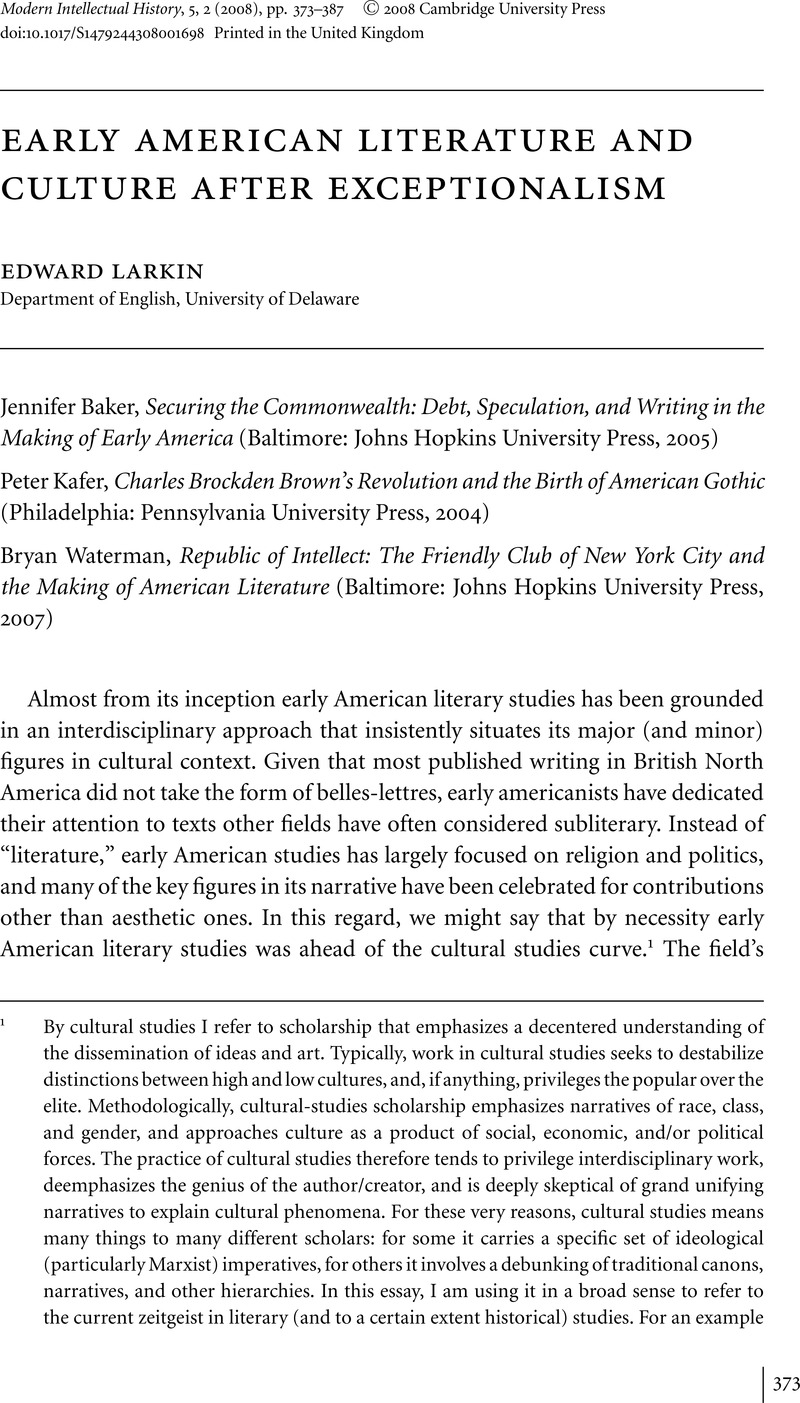No CrossRef data available.
Published online by Cambridge University Press: 01 August 2008

1 By cultural studies I refer to scholarship that emphasizes a decentered understanding of the dissemination of ideas and art. Typically, work in cultural studies seeks to destabilize distinctions between high and low cultures, and, if anything, privileges the popular over the elite. Methodologically, cultural-studies scholarship emphasizes narratives of race, class, and gender, and approaches culture as a product of social, economic, and/or political forces. The practice of cultural studies therefore tends to privilege interdisciplinary work, deemphasizes the genius of the author/creator, and is deeply skeptical of grand unifying narratives to explain cultural phenomena. For these very reasons, cultural studies means many things to many different scholars: for some it carries a specific set of ideological (particularly Marxist) imperatives, for others it involves a debunking of traditional canons, narratives, and other hierarchies. In this essay, I am using it in a broad sense to refer to the current zeitgeist in literary (and to a certain extent historical) studies. For an example of the diversity of work that fits under the rubric of cultural studies see the collection of essays edited by Grossberg, Lawrence, Nelson, Cary, and Treichler, Paula A. under the title Cultural Studies (New York: Routledge, 1992)Google Scholar.
2 For the classic example see Matthiessen, F. O., American Renaissance: Art and Expression in the Age of Emerson and Whitman (New York: Oxford University Press, 1941)Google Scholar.
3 Perhaps the scholar most identified with the effort to dismantle the canon of the American renaissance in the 1980s was Tompkins, Jane, with her Sensational Designs: The Cultural Work of American Fiction, 1790–1860 (New York: Oxford University Press, 1985)Google Scholar. Walter Benn Michaels, Donald Pease, and Eric Sundquist also published important works challenging the established narrative of nineteenth-century American literary history.
4 In the 1990s Julia Stern and Elizabeth Barnes, for example, both published influential studies that gender the early American novel female. Although both of them attend to Brown's work, they privilege Foster and Rowson's contributions by making their novels more representative of the concerns of the age. Barnes, Elizabeth, States of Sympathy: Seduction and Democracy in the American Novel (New York: Columbia University Press, 1997)Google Scholar; Stern, Julia, The Plight of Feeling: Sympathy and Dissent in the Early American Novel (Chicago, Chicago University Press, 1997)CrossRefGoogle Scholar.
5 Although the term was coined by Alexis de Tocqueville in the nineteenth century, what we might call the modern scholarly narrative of exceptionalism, to which I refer here, begins more properly with Vernon Parrington and Charles Beard in the 1920s and 1930s. Since then a host of scholars in history and literary studies have made important contributions to developing the narrative of exceptionalism, including, for example, Perry Miller, Henry Steele Commanger, Richard Hofstadter, and Leslie Fiedler. Sacvan Bercovitch is perhaps the last of the great exceptionalist literary scholars.
6 Warner, Michael, The Letters of the Republic: Publication and the Public Sphere in Eighteenth-Century America (Cambridge, MA: Harvard University Press, 1990)Google Scholar.
7 Habermas, Jürgen, The Structural Transformation of the Public Sphere: An Inquiry into a Category of Bourgeois Society, trans. Burger, Thomas (Cambridge, MA: MIT Press, 1989)Google Scholar.
8 Smith, Adam, The Theory of Moral Sentiments, ed. Haakonssen, Knud (New York: Cambridge University Press, 2002)CrossRefGoogle Scholar; Smith, Adam, An Inquiry into the Nature and Causes of the Wealth of Nations, ed. Cannan, Edwin (Chicago, Chicago University Press, 1976)Google Scholar.
9 See Edwin Cannan's “Introduction” to the Chicago University Press edition of Wealth (xxiv).
10 Although not all Americans shared this ideal—Jefferson and his fellow travelers, for example, were deeply suspicious of commerce—it was the model enshrined in the United States Constitution thanks in large part to Alexander Hamilton's efforts.